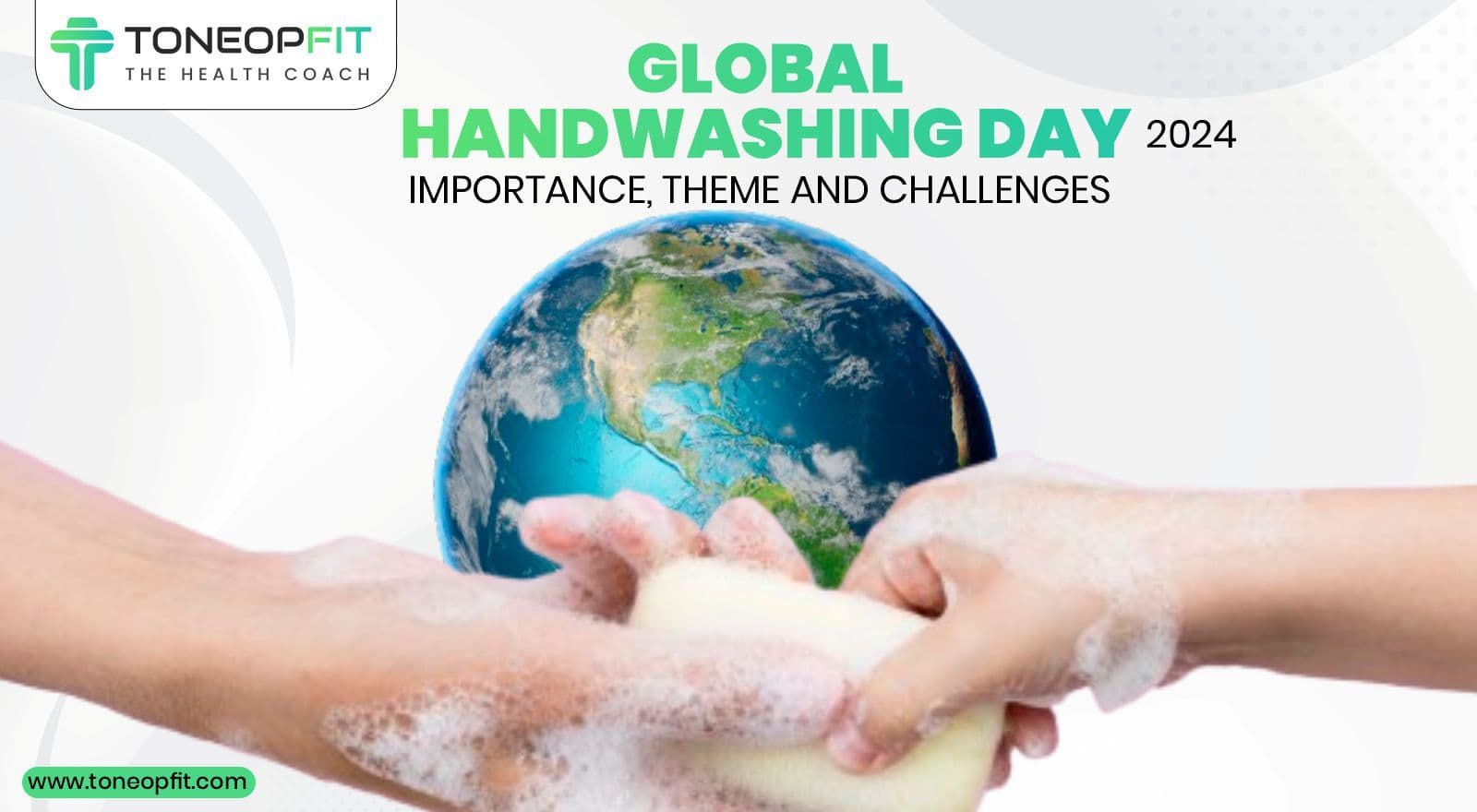In the journey of health, handwashing is the compass that points us in the right direction.
Global Handwashing Day 2024 is a crucial reminder of how simple actions, like washing hands with soap, can save lives and improve public health. Celebrated on 15th October, this day focuses on the need for better hand hygiene worldwide, especially in countries like India, where many people still struggle to access clean water and soap. The importance of Global Handwashing Day is in raising awareness about how handwashing helps prevent illnesses such as diarrhoea, respiratory infections, and even COVID-19.
Handwashing is also directly connected to the United Nations Sustainable Development Goals (SDGs), particularly those related to good health and well-being (SDG 3), clean water and sanitation (SDG 6), and reducing inequalities (SDG 10).
In India, many people face challenges like water scarcity and poor sanitation in rural areas. It’s really important to raise awareness and promote good hygiene habits. With over 800 million children lacking proper handwashing facilities in schools, the need for awareness is urgent. The Global Handwashing Day 2024 theme, “Why are clean hands still important?” emphasises the importance of universal access to soap and water, ensuring that no one is left behind, especially vulnerable groups like children and rural communities.
This year's focus is on spreading awareness and addressing the systemic challenges that prevent universal hand hygiene. In this article, we will understand how handwashing remains one of the simplest and most effective ways to protect communities from preventable diseases. Keep reading!
Key Highlights
- In India, only 49.4% of rural households have access to both water and soap for handwashing.
- Over 50 million people in India lack access to effective handwashing facilities, increasing their risk of disease transmission.
- Handwashing can decrease respiratory infections, like colds, by 16%–21%.
- Poor sanitation is a leading cause of pneumonia and diarrhoea, two of the biggest killers in children under five.
Table Of Contents
- Why Is Global Handwashing Day Celebrated?
- What Is The Theme and Slogan of Global Handwashing Day 2024?
- Importance of Global Handwashing Day: Benefits Of Practising Good Hand Hygiene
- How To Celebrate Global Handwashing Day?
- Challenges To Achieving Universal Hand Hygiene
- Expert’s Advice
- The Final Say
- FAQs
- References
Why Is Global Handwashing Day Celebrated?
Hand hygiene is a simple act with a powerful impact. Let's make it a part of our daily routine.
Global Handwashing Day was started in 2008 by the Global Handwashing Partnership. It aims to raise awareness about the importance of washing hands with soap to prevent diseases. Since then, it has become a global campaign, reaching over 200 million people in more than 100 countries. This day focuses on handwashing as a key public health measure and supports the United Nations Sustainable Development Goals (SDGs), which include everyone's access to clean water and sanitation.
Many groups, including governments, schools, NGOs, and private companies, support Global Handwashing Day. Promoting hand hygiene is especially important in India, where many people face water shortages and poor sanitation. Proper handwashing can reduce the spread of illnesses like diarrhoea and pneumonia, which are major health issues for children.
In India, hand hygiene is integral to achieving the Sustainable Development Goals (SDGs), particularly in relation to clean water and sanitation. Despite existing initiatives like the Swachh Bharat Mission and the Jal Jeevan Mission, there remains a critical need for better access to handwashing facilities. Currently, only 65% of the population has basic hygiene services, with rural areas lagging behind at 60% compared to 82% in urban settings. This lack of access contributes to malnutrition diseases, and other health issues, underscoring the need for targeted interventions.
Also Read: World Arthritis Day 2024: How Arthritis Affects Your Life? Understanding The Causes And Prevention
What Is The Theme and Slogan of Global Handwashing Day 2024?
The 2024 Global Handwashing Day theme/slogan is “Why are clean hands still important?”
The question presented for this year's Global Handwashing Day theme is essential: We are told to wash our hands and give importance to this message even now; why is this so?
Even though there’s more awareness about hand hygiene now, it's important to keep improving handwashing habits, even after threats like COVID-19 are gone. Washing hands is still one of the best ways to prevent infections, diseases, and bacteria. Whether it’s in hospitals, schools, or just interacting with others, handwashing with soap leads to better health and helps keep communities safe.
As the world celebrates the progress made in hand hygiene, it’s a good time to reflect on why having clean hands matters. The answer is simple: it's our shared responsibility to protect people’s health, reduce the spread of diseases like cholera and jaundice, maintain dignity, and improve the quality of life for everyone.
Importance of Global Handwashing Day: Benefits Of Practising Good Hand Hygiene

The following are the benefits of practising good hand hygiene:
Benefit | Description |
| Reduction of Diarrhea Incidences | Hand washing with soap can reduce incidences of diarrhoea by one-third. |
| Lowering Respiratory Infection Risk | The use of soap can help reduce the risk of acute respiratory infections by up to 20%. |
| Prevention of Infectious Diseases | Washing hands with soap helps avoid transmission of diseases such as cholera, Ebola, shigellosis, SARS, HEV, COVID-19, and monkeypox. |
| Healthcare-Associated Infections | Hand hygiene is crucial for preventing healthcare-associated infections and reducing antimicrobial resistance. |
| Impact on Neglected Tropical Diseases | Hand washing may significantly decrease the incidence of Neglected Tropical Diseases. |
| Promotion of Wellbeing and Productivity | Good hand hygiene is linked not only to decreased disease incidence but also to improved school attendance, well-being, dignity, and productivity. |
Also Read: World Heart Day 2024: Theme, Motto And Engaging Activities To Promote Heart Health
How To Celebrate Global Handwashing Day?
In India, Global Handwashing Day activities focus on promoting better health through handwashing, especially in rural areas where clean water and soap are often not available. Key activities include:
- Public health campaigns, school events, and community engagements to raise awareness about the importance of washing hands with soap.
- Various groups like the government, schools, NGOs, and healthcare organisations can help spread the message and encourage proper handwashing habits.
Since schools play a crucial role in promoting hygiene, they can organise fun activities to observe the day, such as:
- Essay writing competitions on hygiene.
- Handwashing demonstrations and exercises.
- Fun games that teach children the importance of washing hands.
- Distribution of posters and materials to educate students and their families about hand hygiene.
- Global Handwashing Day speech and debate competitions.
Communities can also set up handwashing stations in busy public places like markets, bus stations, and health centres. This will help people, especially children, learn the correct way to wash their hands.
The government can support these efforts by:
- Launching programs that provide clean water and soap in areas that need it most.
- Partnering with companies to ensure public places, like schools and bus stations, have proper handwashing facilities.
- Using TV, radio, and social media campaigns to spread the message to a wider audience.
Through these efforts, everyone can contribute to better health and hygiene across the country.
Challenges To Achieving Universal Hand Hygiene
In healthcare, clean hands are not just a protocol; they're a patient's promise of safety.
The second target of SGD 6 is to ensure sustainable sanitation and hygiene for all by the end of 2030, reducing the proportion of the population practising open defecation, particularly among women, girls, and the vulnerable. Hand washing is one of the right ways to wash different parts of the body during the washing process.
Currently, it is estimated that over 2.3 billion people around the globe, or even thrice of the global population or every third person, do not have access to wash their hands at home with water and soap. This comprises the 670 million population who have no hand washing facility at all. Even then, hand hygiene facilities are still inadequate in most homes, healthcare facilities, schools, and other public places.
In some cultures, people do not wash their hands; others do not know that they should, or it goes against their tradition. Research shows that the practice of washing hands often may be absent despite the availability of water and soap. Hence, successful behaviour modification requires the use of educational and communication techniques that are compatible with the community's culture.
There is also the challenge of resource constraints. In the least developed countries where governments struggle to provide basic health needs infrastructure, WASH investments may, at times, not be well prioritised. Also, with the availability of funds, these countries might lack the ability to launch and maintain effective campaigns to encourage washing of hands.
Also Read: Doctors Day 2024: How Do Doctors Maintain Their Health? 10 Tips For A Healthy Lifestyle
Expert’s Advice
As a health expert, I would recommend focusing on the main celebration of the day, that is, the correlation between cleanliness and diet, on Global Handwashing Day 2024. Washing hands with water and soap is important to prevent infections from contaminated food products and to maintain good health in the digestive system.
Before preparing the food, ensure to wash your hands with soap to avoid getting bacteria and pathogens on the foods, which may cause infections and make the body lack nutrients. For the sake of families’ health, teach children to wash their hands before they eat because if they catch a bug, they will not eat and, therefore, will not grow properly.
Health Expert
Akshata Gandevikar
The Final Say
Global Handwashing Day 2024 serves as a constant message that washing hands is something that people of the world must do. More campaigns should be employed and pursued to achieve sustainable hand washing and the vision of everyone washing their hands. It is very important that everyone, and anywhere, can wash their hands often. Networks of cooperation between governments, healthcare, educational systems, communities, and single people are necessary to ensure that handwashing is routine.
FAQs
1. Why is handwashing with soap especially important in India, and how does it impact public health?
Handwashing with soap in India helps prevent diseases like diarrhoea and respiratory infections, which are common causes of illness and death, especially in children. It’s a simple way to improve public health and reduce healthcare costs.
2. What are the main barriers to effective handwashing practices in rural areas of India?
Lack of access to clean water, limited availability of soap, and inadequate facilities are the main barriers to effective handwashing in rural areas of India.
3. How can schools in India promote better handwashing habits among children?
Schools can promote handwashing by setting up handwashing stations, organising hygiene-related activities, and teaching children the importance of washing hands regularly, especially before eating and after using the toilet.
4. What role does access to clean water play in improving hand hygiene in Indian households?
Access to clean water is essential for regular handwashing. Without it, maintaining hygiene becomes difficult, which increases the risk of disease transmission in households.
5. How has the COVID-19 pandemic influenced handwashing behaviours in India, and what lessons can be learned for the future?
The COVID-19 pandemic raised awareness about the importance of handwashing, leading to improved hygiene practices. The lesson for the future is to continue promoting hand hygiene as a long-term public health measure.
References
- https://www.cdc.gov/clean-hands/globalhandwashingday/index.html
- https://globalhandwashing.org/resources/global-handwashing-day-2024-fact-sheet/#:~:text=Why%20are%20clean%20hands%20still,enhance%20dignity%20and%20promote%20wellbeing.
- https://www.medicoverhospitals.in/articles/global-handwashing-day-2022
- https://www.unicef.org/media/108356/file/State%20of%20the%20World%E2%80%99s%20Hand%20Hygiene.pdf
- https://globalhandwashing.org/global-handwashing-day/about-ghd/
About ToneOp Fit
ToneOp Fit is a platform dedicated to improving and maintaining good health through a comprehensive range of goal-oriented health plans with up to 3 Coach support. With a range of Weight Management, Medical Condition, Detox Plans, and Face Yoga Plans, the app also provides premium health trackers, recipes and health content. Get customised diet, fitness, naturopathy & yoga plans and transform yourself with ToneOp.








































